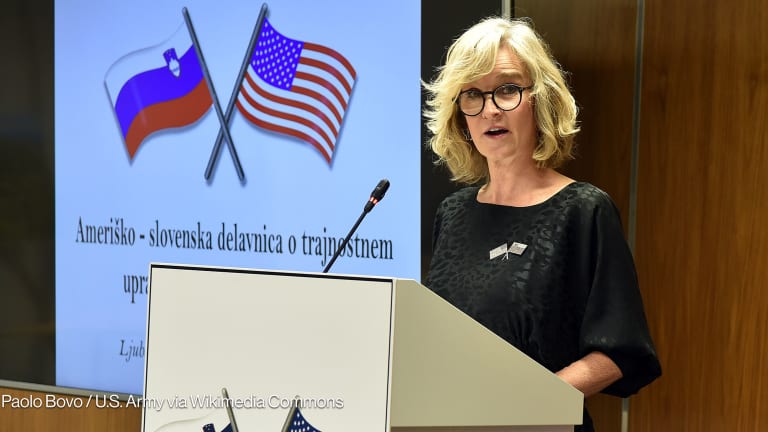
Scott Nathan, President Joe Biden’s nominee to lead the U.S. International Development Finance Corporation as its CEO, faced the Senate Foreign Relations Committee on Wednesday for his nomination hearing.
Nathan’s remarks clearly indicated that he’s been doing his homework, including meeting with quite a few former leaders of the agency he seeks to lead. And while committee members did ask him some questions about key issues — such as the tension between DFC’s development and foreign policy mandates, as well as the agency’s climate policy — little was surprising or particularly telling in his answers.
Nathan, who has a background in both finance and government, doesn’t have much development experience. But that is not that unusual among former leaders of U.S. development finance institutions.
“This is an exciting and important time for DFC,” Nathan said at the hearing. “The agency is less than 2 years old, but the expectations for it are high.”
In his opening remarks to the committee, he said he looks forward to working with Congress “to shape and to continue to grow DFC’s capabilities and capacity.”
Nathan said he would “work hard to make sure the agency has the right strategy, resources, structure, processes to ... source and analyze investment opportunities,” adding that he will also ensure that investments are properly measured and monitored.
“I believe in the power of the private sector, free markets, and inclusive economic growth to improve lives and bring countries out of poverty,” he said. In fiscal year 2021, DFC committed $6.7 billion to support private sector development projects.
Nathan awaits a committee vote if his nomination is approved. Then, the full Senate will need to vote. When that could happen is unknown, as Sen. Ted Cruz of Texas is holding up votes on dozens of nominees.
Sen. Bob Menendez, a Democrat from New Jersey and chairman of the committee, asked Nathan how he would manage the tension between the agency's development objectives and the United States’ strategic needs.
“The BUILD Act laid out a dual mandate for the corporation, both developmental and strategic, but also directed the corporation to focus on the poorest countries in the world,” Nathan said, referring to the Better Utilization of Investments Leading to Development Act — legislation that authorized and created DFC.
While mobilizing private capital to worthy projects can help development, thinking about the strategic foreign policy concerns of the U.S. is also important, he said.
“I believe that good development is good for our national security and can help meet the challenges posed by our strategic competitors,” Nathan said.
One of his priorities, if confirmed, would be finding European energy projects as authorized under the European Energy Security and Diversification Act, he said. That bill created an exemption allowing DFC to invest in higher-income countries in the region.
Nathan was also asked by Sen. Bill Hagerty, a Republican from Tennessee, if DFC needs more flexible authorities to invest in additional middle- and high-income countries elsewhere.
Nathan responded that the BUILD Act had expanded DFC’s tools and authorities. And if confirmed, he would help DFC “take full advantage of those tools to … help counter the malign influence of state-directed investments by authoritarian governments,” he said.
On the question of expansion, Nathan was noncommittal, saying he would work with Hagerty and other lawmakers “if there’s further expansion that would make sense.”
The issue of DFC’s energy investments — and whether it will continue making fossil fuel investments, if that’s what so-called developing countries want and will spur economic growth — came up a few times.
DFC is not restricted on what technology it uses in its energy projects, Nathan said, pointing to two oil and gas projects — in Iraqi Kurdistan and Sierra Leone — that the agency committed to finance last year.
“Good development is good for our national security and can help meet the challenges posed by our strategic competitors.”
— Scott Nathan, nominee to lead the U.S. International Development Finance CorporationWhile that is true for now, a climate policy released earlier this year established a timeline for DFC to cease fossil fuel investments and sets a higher bar for the occasions in which the agency will fund them in the interim.
The issue of DFC’s equity authority also came up. While the agency was given the authority to make equity investments in its authorizing legislation, the way it is scored for budget purposes has limited how much DFC can invest annually, to the extent that many experts see this as effectively hamstringing that part of its operations.
Nathan said that equity authority is an “important tool” because “it would allow DFC to go further out on the risk spectrum,” increase its focus on the lowest-income countries, and give the agency a seat at the table with other DFIs and multilateral development banks.
Judging by the support Nathan received from some committee members and Sen. Mark Warner of Virginia — an old friend who made a special appearance to introduce him — few barriers seemed to stand in the way of his approval.
Warner described Nathan as “practical, collaborative, and very independent-minded” and said he was “uniquely suited for this job.”




